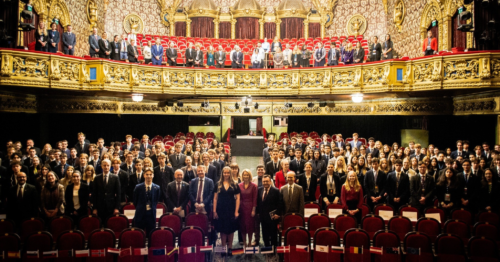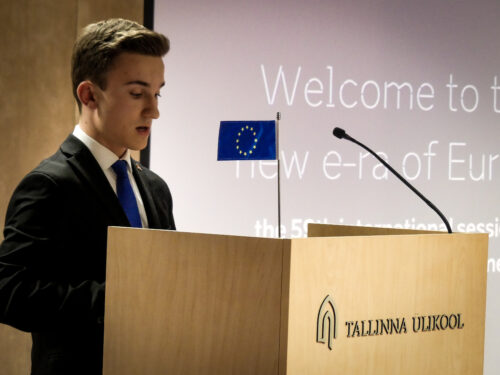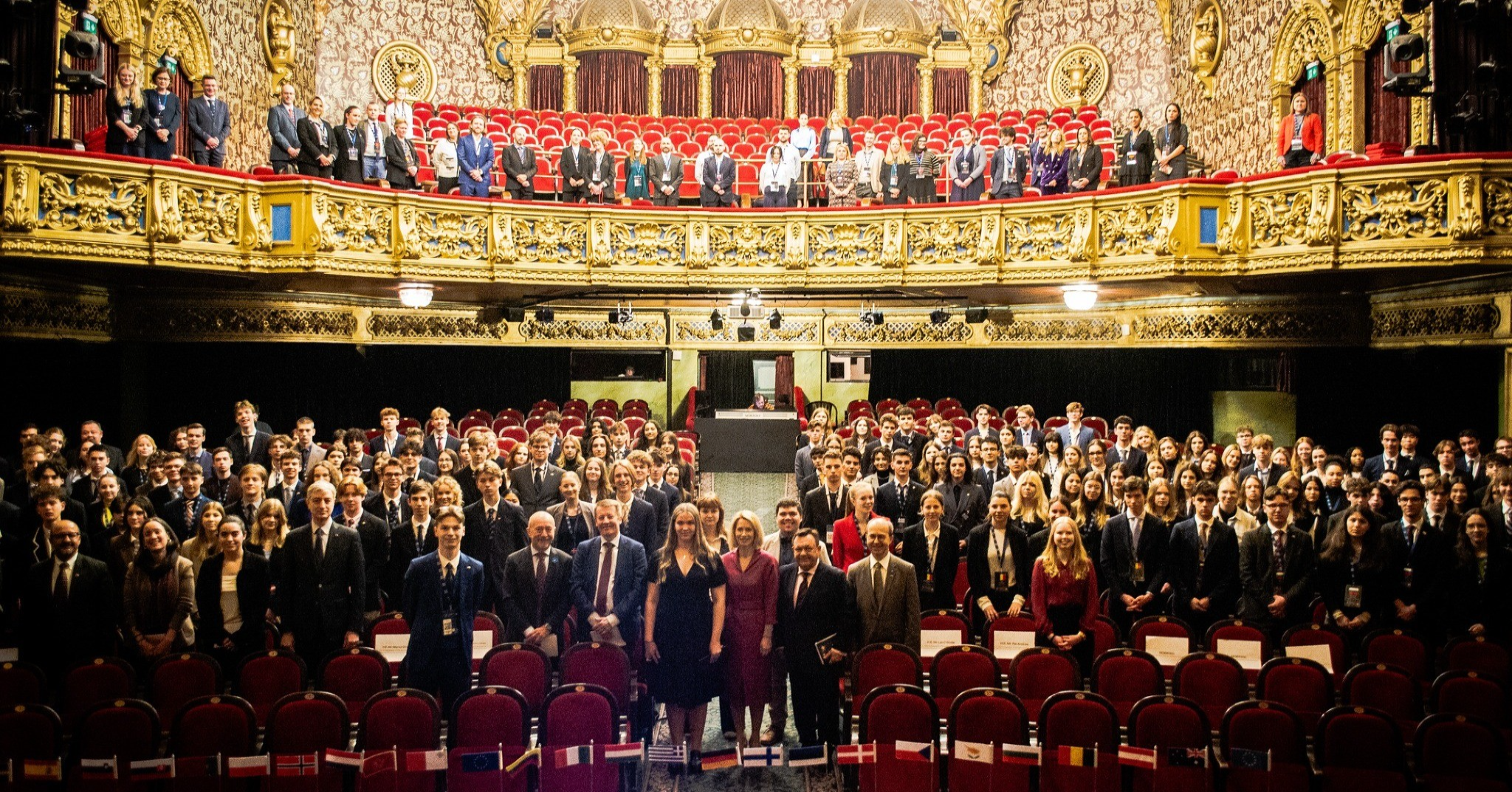
Tallinn 19.04.2024:
Thank you for the floor, Mr/Mdm President!
Honourable fellow Presidents,
distinguished Committee Presidents,
dear delegates,
teachers, directors, coordinators,
guests,
ladies and gentlemen,
Working in committees, debating about the future of the European Union, thinking, and working on the ideas for a better Europe.
And no it is not Brussels or Strasbourg, I’m not talking about some parliamentarians, I’m not speaking about elected members of the European Parliament.
I’m talking about young people, mostly students, I’m talking about Tallinn, talking about you!
And well as in many other speeches I’m not going to talk about your wonderful committee work, your great contributions you’ve made during the last days, amendments and speeches during the General Assembly and your engagement for the future of Europe. This is just a simulation, just proposals without any direct effect on politics, neither on the European level, your national or the regional level. Nothing else.
The MEP is just fake!
But why are we here now? Why are we debating about and voting on resolutions? Why am I speaking to you?
Well we are here to experience the impact of the MEP. And I would like to mention three parts there:
- The impact on European politics
- The impact on your personal development in politics and work
- The impact on yourselve
Your resolutions booklet here just consists of pages of paper, it’s nothing else if you do not work on realising your ideas. In here I saw some very good ideas, whether they are good for the European Union and will work was part of your discussions this week, in the committee sessions and the General Assembly. But they won’t get real if you don’t fight for that.
Therefore you can contact politicians. Doesn’t matter whether Members of the European Parliament, members of your national or regional parliaments or local authorities. Everyone is able to let some of your ideas become true. And we need everyone of you to talk to them, to convince them of your ideas.
But it is not just about politics. You can talk to companies working in the fields of the topics of your committee, public authorities, organizations, informal groups and so on. There’s a long list of opportunities to present your ideas, discussing them and working on realisation of your ideas. Sometimes you will have to rework the OC, presenting a new proposal. In the end you’ll experience the long way of European democracy, where not just a group of 150 people is able to decide alone. You are going to experience the long time of consolidating ideas of many people, getting opinions together in a much larger scale than the MEP actually does.
And well it might be not the first time that a committee uses this opportunity. We already have had talks with many Members of the European Parliament, members of national and regional parliaments. And I personally took part in a discussion with one of the biggest European companies of recycling technologies about the topic of circular economy. And the reaction was the opposite of “that are just stupid ideas of some young people”, the reaction was like “these are great ideas, and we don’t know why they are not implemented yet”.

And secondly the MEP will have an impact on your life. For some of you this might have been the reason why you become a member of a party, maybe a member of an NGO, for others it might have been the reason why you expanded your engagement in a party or the youth organization or an NGO.
This is a point where I want to share some personal remarks with you. As some of you already know I’m member of the Christian-Democratic party in Germany, engaging in their youth organization and now working as one of the youngest policy advisors for a member of the regional parliament of Bavaria in my home city Munich. And in the end, I’m not just the “little trainee”, no I’m a fully member of the cabinet, organizing appointments for example together with the Chairman of the parliamentary group of the Christian Social Party of Bavaria. When I applied for this job last autumn after the elections I named the MEP as my biggest reference, and – to be honest – I haven’t thought that I get the job. Well, you see my interests in politics, my active engagement in the MEP have actually been the reason why they’ve chosen me for the job.
But we are all youth people, no one knows whether anyone of us is going to be a future Member of the European Parliament. We don’t know whether anyone here will go into the field of politics. We all hopefully will develop our personal career a bit further after this week in Tallinn. And at this point I’d kindly like to ask you to use the impact of the session, to think about what you’ve learned during this week. Maybe it was doing research or writing texts, talking to new people, travelling by your own. Please start thinking about what you’ve learned here and how you want to use the skills in your further development.
And lastly, I want to draw the attention to the social environment and what you can to learn at the MEP in this field. For sure many of you might have heard about MEP friendships before. But what does that actually mean? Just being one week together in a big city in Europe and taking part in the MEP project? No it’s more. It’s the place where everyone of you is able to start a new era of friendships.
And therefore I want to share some personal remarks, again. My first face to face iMEP session took place one and a half year ago in the Bulgarian capital Sofia. Also my delegation, the delegation of Germany came together from seven different cities all over Germany, from the very north to the very south. We all had a distance of hundreds of kilometres away from each other. And together we met the first time at the Sofia Airport and went to our rooms in the hotel. And in my twin room there I was together with another guy from Germany. Firstly we remained silent, but after a while we started talking to each other. Talking about soccer, politics and about ourselves. We have been there in this room for one whole week. And well now we are still in contact, living more than 800 kilometres from each other. We do not just write messages to each other nearly daily; we are visiting us every two or three months, experiencing German Railway at its best. I’ve been to this cute Northern German city for many times now, as well as he has been to Munich many times now. And as a highlight I’ve been to his 18th birthday one month ago at the party with his family and his closest friends. So what started as two roommates in an iMEP session has now become a very close friendship where a distance doesn’t matter anymore. It’s the MEP that has taught to talk to a new person that fast and to stay in contact although if there’s a long distance apart from each other – in this case 800 kilometres. It’s nothing I’ve done before, but to experience this you will have to step out of your comfort zone.
One last personal remark I want to share is another thing about MEP friendships: unlike most of you I’m not going to school anymore, I finished it last summer. There’s one thing I miss most: it is the permanent contact with nearly all of my friends. After that some of them went to other cities to study there, some of them started studying in Munich. But they all have one thing in common: I don’t see them that often anymore like I did in school. And that’s one of the most important things the MEP has taught me. Stay in touch with your friends, find ways to meet each other because you won’t see them every day anymore.
Now everyone here hopefully sees that the MEP is the incentive to a further engagement. It could be the start of something great und very helpful thing for you. But therefore you will have to use your voice.
For your further engagement I would like to repeat one famous quote I heard in many MEP sessions before, a quote similar to a famous one by JFK: “Ask not what Europe can do for you, but ask what you can do for Europe!”
I’m glad to be able to contribute to you all now at the closing ceremony of my last MEP session after a lot experiences in many famous cities like Brussels, Munich, Sofia and – now – Tallinn!
And at this point, the end of this session I want to say one last thing:
THANK YOU!
